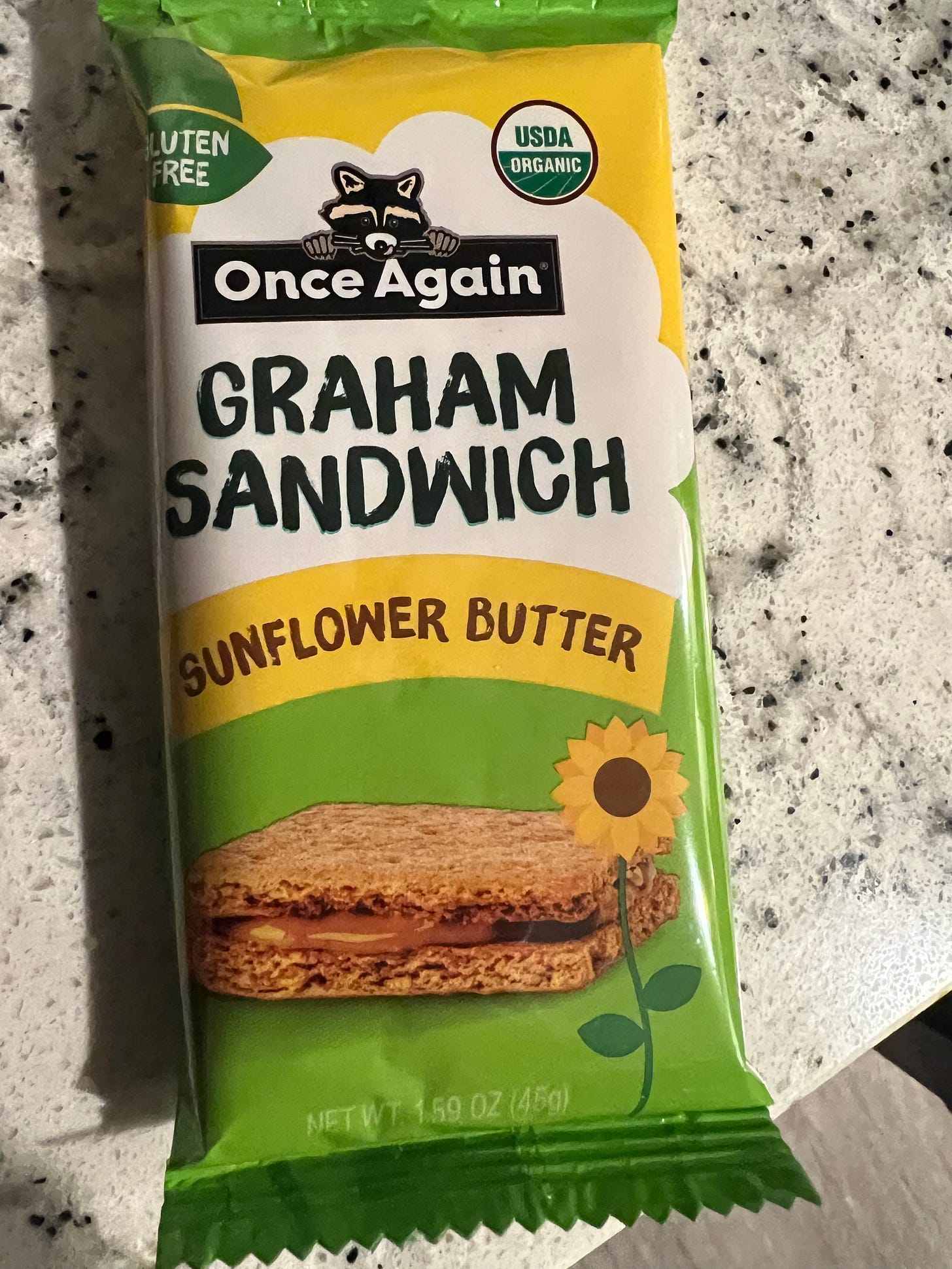Grocery Update Volume 2, #18: Every Day Is Labor Day.
Also: Congress Takes on Price Gouging and ILSR Takes on Pepsico Price Discrimination. Plus, More Pallets.
Discontents: 1. Every Day Is Labor Day. 2. Dr. Bronner’s Annual Highlights. 3. ILSR Takes On Pepsico Price Discrimination. 4. Stop Price Gouging in Grocery Stores Act. 5. Seen In The Wild.
First, a message from “Saul” and United Farm Workers:
"Saul" shared this from where he's harvesting romaine lettuce. The crew has 26 workers. One group harvest the lettuce, the next group bags it and the last group puts it in the boxes.
1. Every Day Is Labor Day.
Grocery workers feed the world. Yes: no food, no farmers. And yes, farmworkers are the hidden, underpaid backbone of the food system (see below). But grocery workers, damn. Credit is due. Big shout out to all the clerks and cashiers.
No work is insignificant. All labor that uplifts humanity has dignity.- Martin Luther King, Jr.
Over $1.1 trillion in annual grocery revenue is wholly dependent on the clerks, cashiers, receivers, purchasing managers, replenishment buyers, team leaders and shift supervisors who receive loads at the dock, load products on the carts and U-boats, stock thousands of pieces to shelves every shift, redeem SNAP funds and ring customers up at the checkout (or assist customers with ringing themselves up at the self-checkouts). Grocery workers feed everyone.
Working nine to five, what a way to make a livin'
Barely gettin' by, it's all takin' and no givin'
They just use your mind and you never get the credit
It's enough to drive you crazy if you let it
Dolly Parton -“9 to 5”
Grocery work is not easy. It is physical, it is mental, it requires a lot of emotional energy, dealing with customers or suppliers, late deliveries, out of stocks, covering for your co-workers who called out or are having a bad day. It isn’t easy, feeding the world, feeding your community.
Labor is prior to and independent of capital. Capital is only the fruit of labor, and could never have existed if labor had not first existed. Labor is the superior of capital, and deserves much the higher consideration. Capital has its rights, which are as worthy of protection as any other rights. Nor is it denied that there is, and probably always will be, a relation between labor and capital producing mutual benefits. The error is in assuming that the whole labor of community exists within that relation. -President Abraham Lincoln.
Grocery store labor budgets are the biggest variable expense for stores. About 10-15 cents of every dollar spent at grocery stores goes to labor, and 20-25% of that is just for cashiers and guest service clerks. Discounters and mass merchants like Walmart and Aldi are much lower, while higher end specialty shops are higher, especially when they have a lot of full service venues and prepared foods. On the other hand, net income is usually 3-5 cents of every dollar spent, sometimes higher, sometimes lower. Profitability is highly dependent on scale and volume, as much as it is about suppressing wage growth and cost of living increases and keeping scheduling tight. I was in a local Whole Foods a few months back and the manager was telling me how he was having to ramp back on labor spending in anticipation of the summer slowdown in sales, and all I could think was how those cashiers and clerks couldn’t likewise ramp down on their rent, food spending and credit card payments now that they were getting fewer hours at work. Why isn’t this part of the calculus?
Five days to go; working for the next day
Four days to go; working for the next day
Say we got; three days to go now, working for the next day
Two days to go (ooh); working for the next day, yeah
Say we got; one day to go: working for the - Every day is work - work - work - work!
-Bob Marley and the Wailers- “Work”
Full time work is harder to come by these days in grocery stores. Twenty years ago, Whole Foods was 80/20 full time to part time. By 2010 they were 60/40. By 2020, part timers were far and away the majority of new hires and retained employees in stores. It’s tough to make a living wage at 25 or 30 hours a week without working one or two additional part time jobs. Some folks like it that way. But it’s no way to build a career or have a reasonably sustainable schedule, or have much of a life outside of the grind to make rent, bills, debt payments, and not be living paycheck to paycheck.
Aint' got no cards, don't pay no tax
For a score in me hand I'll be breaking me back
I'll been working
And I'll been working all day for me mate
Call me a crook, call me bent
But I need more than food and rent I've been working
And I've been working all day for me mate
-Cock Sparrer, “Working”
On a broader level, a living wage is the hourly rate that an individual in a household must earn to support themselves and/or their family, working full-time, 40 hours per week, or 2080 hours per year. It is not a thriving wage, it is not a living the fuck out of life wage. This is just to cover necessities and varies by city and state.
In New Haven, CT, The Living Wage for a single worker with no children is $24.97, with one child, $49.26 and two children, $63.67. In Los Angeles, this is $27.81, $48.65 and $60.54 respectively. In Dallas, $23.06, $37.97 and $58.75. Even in rural Arkansas, $18.48, $30.90 and $38.51 and rural Oklahoma, $18.79 for an adult with no children, $32.85 with one child and $41.34 with two children.
The median income in the USA is $39,982 a year, about $19.22 an hour. The U.S. hourly minimum wage is still $7.25 an hour, a bit higher in 30 states. But nowhere is it a living wage. If wages had kept up with productivity, the minimum wage would be around $25 an hour. If wages had kept up with Wall Street profits, around $44 an hour. If wages kept up with the buying power that Baby Boomers enjoyed in their prime, we’re talking over $65 an hour. And over the last 50 years, the bottom 90 percent of workers should have earned $79 trillion more than they took home.
We're the first ones to starve, we're the first ones to die
The first ones in line for that pie-in-the-sky
And we're always the last when the cream is shared out
For the worker is working when the fat cat's about
-”Workers’ Song”, Dick Gaughan covered by Dropkick Murphys
On the other end of the wage conversation is wage theft. Wage theft is by far the largest property crime in the U.S., outranking all other property crimes combined, including burglary, car theft, armed robbery, bank robbery, etc. An estimated $50 billion a year is stolen from waged workers in the U.S.A., most of which is never recovered. Wage theft includes “not compensating workers for time worked, violating minimum wage and overtime laws, misclassifying employees as independent contractors, not providing legally required meal breaks, confiscating worker tips, or illegally taking deductions from worker wages”. Some of the biggest companies are the biggest violators, including Amazon, Walmart and FedEx. The U.S. economy literally runs on wage suppression and wage theft.
And yet, the Jewish, Christian and Islamic traditions display zero ambiguity regarding the rights of workers and responsibilities of employers for fair, just and timely wages. Zero.
No labor, however humble, is dishonoring. -The Talmud
The Talmud also states that “he who withholds an employee’s wages is as though he deprived him of his life.”
Do not oppress your neighbor and do not rob him. Do not keep the wages of the worker with you until morning. -Leviticus/Vayikra 19:13
Do not oppress the hired laborer who is poor and needy, whether he is one of your people or one of the sojourners in your land within your gates. -Deuteronomy/Devarim 24:14-15
“No one can serve two masters, for either he will hate the one and love the other, or he will be devoted to the one and despise the other. You cannot serve God and money.” -Matthew 6:24
“It is the hard-working farmer who ought to have the first share of the crops.” -Timothy 2:6
The Quran (11:15) states: "… We will surely give them their due reward, and they will not be wronged."
The Quran (3:195) also states: "And never will I allow to be lost the work of [any] worker among you, whether male or female."
And the Prophet Muhammad said, "Give the worker his wages before his sweat dries."
Zero ambiguity here, folks, or likewise, in Buddhism’s concept of “right livelihoods”.
While I try to respect anyone’s faith and interpretation, you don’t see a lot of Lev 19:13, Deut 24:15 or Matthew 6:24 tattoos, but always a lot of energy on culture war nonsense or violations of bodily autonomy. And I say this as an agnostic who has spent more than his fair share of time in bible and religious studies, that God- whether you believe in or not- is on the side of workers.
And one more thought for farmworkers this Labor Day. An EPI study showed that a 40% increase in farmworker pay would cost just $25 per U.S. household per year. Farmworkers are among the lowest paid in the country and are subject to wage theft, abuse, harassment and threats from law enforcement due to their immigration status. A 40% raise, just $25 a year.
Lastly, here is a list of worker-friendly ultra-processed consumables via Labor 411:
Hot Dogs, Meats, & Buns
Ball Park Franks (UFCW, IBT)
Butterball turkey tenderloins, drumsticks, burgers, and franks (UFCW, IBT)
Dearborn Sausage Company (IBT)
Empire Kosher chicken and turkey (UFCW)
Farmer John (IBT)
Foster Farms poultry (IBT, UFCW)
Hormel beef, pork, and chicken franks (IBT)
Sara Lee buns (BCTGM, IBT, UFCW)
Oroweat buns (BCTGM)
Snacks
Cheez-It (BCTGM)
Cheetos (BCTGM)
Doritos (BCTGM, IBT)
Keebler (BCTGM, IBT)
Nabisco (IBT)
Ritz Crackers (BCTGM, IBT)
Rold Gold Pretzels (BCTGM, IBT)
Sun Chips (BCTGM, IBT)
Wheat Thins (BCTGM, IBT)
Beer
Budweiser (IBT, IAM)
Coors Light (IUOE, IBT)
Goose Island (IBT)
Henry Weinhard’s (IUOE, IBT)
Miller Genuine Draft (UAW, IAM, IUOE, IBT)
Miller Lite (UAW, IAM, IUOE, IBT)
Red Stripe (IUE-CWA)
Rolling Rock (IAM)
Sam Adams (IBT, IUOE, SEIU)
Shock Top (IAM, IUOE, IBT)
Stella Artois (IAM)
Drinks
7UP (BCTGM)
A&W (BCTGM)
Barq’s (IBT)
Canada Dry (BCTGM)
Coca-Cola (UAW)
Dr. Pepper (UFCW, UAW)
Gatorade (UAW)
Mountain Dew (IBT)
Pepsi (IBT)
RC Cola (BCTGM)
Sprite (IBT, UAW)
And if you need to shop for groceries on Labor Day, please shop at unionized stores, or indies and co-ops with good labor relations. Shops like Walmart, Amazon Fresh, Whole Foods, Dollar General, Dollar Tree, and Trader Joe’s have all been hostile to unionization efforts and some have even sued to make the National Labor Relations Board irrelevant.
In the meantime, keep feeding the world, friends. We got your back. Happy Labor Day.
2. Dr. Bronner’s Annual Highlights.
We are big fans of Dr. Bronner’s Magic Soaps, as well as plenty of their other products. We don’t hold it against them that David Bronner goes to Burning Man. They do way too much cool stuff. And no, they are not a sponsor of this newsletter. We just want more companies to do likewise.
“When a business leads with integrity—prioritizing people, sustainability, and fairness—it can be transformative. It may take more care, more effort, and more intention—but it creates trust, connection, and lasting impact. In fact, the closer you look, the better you feel. That’s the kind of magic we believe in. The kind worth seeking and demanding in today’s world,” write Dr. Bronner’s Cosmic Engagement Officer (CEO), David Bronner and President, Michael Bronner in the introduction to the report.
Notable figures highlighted in Dr. Bronner’s 2025 All-One! Report include:
· $209.8 million – total revenue in 2024.
· $27.28 – starting salary for full-time employees (70.5% higher than California minimum wage).
· 2,515 – acres of dynamic agroforestry installed in 2024.
· 784,149 – number of trees planted in dynamic agroforestry systems.
· 18,122 – total number of smallholder farmers contributing to Dr. Bronner’s fair trade and organic supply chains.
· $8,137,797 – total USD given to charitable and activist causes in 2024.
The company gave away an estimated $8.4 million in charitable contributions and sponsorships. This amounts to 4% of total revenue given to more than 200 organizations whose work advances animal advocacy, civil & human rights, community betterment & youth services, drug policy & criminal justice reform, and environment & regenerative organic agriculture.
See here for more. It may cheer you up.
3. ILSR Takes On Pepsico Price Discrimination.
The Institute for Local Self-Reliance (ILSR) has filed a motion in federal court to unseal the Federal Trade Commission’s (FTC) antitrust complaint against PepsiCo, which alleges the beverage giant engaged in illegal price discrimination by providing preferential pricing to a major big-box retailer while raising prices for competing independent grocers and their customers.
The case represented a significant test of antitrust enforcement under the Robinson-Patman Act and underscores the growing debate over the FTC’s direction under new leadership. The complaint, filed in January under former Chair Lina Khan, was dropped by the agency in May under current Chairman Andrew Ferguson, leaving crucial details hidden from public view.
The heavily redacted complaint obscures key information, including the identity of the favored retailer, the specific nature of the alleged price discrimination scheme, and its impact on grocery prices and local communities. This lack of transparency comes at a time when grocery prices and food access remain pressing concerns for consumers nationwide.
“The FTC’s complaint, which was filed after a two-year investigation, describes a scheme that may have harmed independent grocers and raised prices for millions of people. But nearly all of it remains under seal,” said Stacy Mitchell of ILSR. “We’re asking the court to lift the redactions because the public has a substantial interest in seeing the evidence and understanding the details of the alleged scheme, knowing which big-box retailer benefited and which retailers were harmed, and the impact on grocery prices and communities.”
Chairman Ferguson called the complaint “weak,” while former Chair Khan characterized PepsiCo’s alleged conduct as a “patently illegal scheme.” The divergence of these statements makes it all the more important that the public be allowed to review the complaint in full.
When initially filed, the FTC stated it would “swiftly seek to lift the redactions.” There is a strong “presumption in favor of public access to judicial documents,” the judge noted, and ordered PepsiCo to justify the redactions. However, the agency dropped the case before PepsiCo’s deadline, effectively preventing the court from ruling on the issue.
“ILSR is exercising its right to access documents, a right that courts have long recognized is critical to an open and democratic judicial system,” said Katherine Van Dyck, attorney for ILSR. “When these documents are hidden behind black boxes, it becomes impossible for the public to judge the fairness and integrity of court proceedings for themselves.”
The implications of the case extend beyond PepsiCo. The Robinson-Patman Act, enacted in 1936 to prevent large retailers from using their market power to secure unfair pricing advantages, has been largely dormant since the 1980s. During that period of non-enforcement, independent grocers’ market share has plummeted from over 50% to approximately 25%, contributing to the proliferation of food deserts in both rural and urban communities.
ILSR argues that without enforcement of the Robinson-Patman Act, dominant retailers and suppliers can continue to engage in practices that eliminate competition and ultimately harm consumers.
And Claire Kelloway of Open Market Institute wrote on the topic last week:
“Without RPA enforcement, dominant retailers like Walmart have been able to use their market power to extract exclusive discounts from suppliers and drive smaller competitors out of business. For example, Pepsi relies on Walmart for 11% of its global net revenue. Losing these sales would devastate Pepsi, so it has an incentive to offer Walmart whatever it takes to stay on its shelves, even if that means it has to charge its less powerful customers more to make up the shortfall.
“RPA opponents argue that large buyers deserve these special prices and services because they operate more efficiently. However, this logic ignores market power. Large chains can operate inefficiently and still use their market power to demand discounts, whereas independents can achieve economies of scale through vehicles such as purchasing co-opsand still pay more for the same truckload of goods.
“The pricing gaps between independents and large chains are substantial… independent grocers report that their wholesale prices are higher than what Walmart charges for the same products at full retail markup. Research by the Institute for Local Self-Reliance suggests that Big Box stores’ unfair pricing advantage contributes to the rise of food deserts. Less regional grocery competition also gives large chains more power to raise prices and keep supplier discounts for themselves…
“For instance, the Pepsi lawsuits challenge Pepsi’s special in-kind services and promotional payments to retailers, rather than just its different product prices. Food corporations pay large retailers for in-store marketing, coupons, and special placement, as well as rebates for hitting certain sales goals or giving their products a large portion of their shelf space. They also offer free or heavily discounted services, like stocking the shelves or designing entire sections of the store (conveniently, this lets big brands decide where their competitors sit on the shelf).
“These marketing payments and services are an increasingly important part of the grocery business model, driving both profits and sales. The class action lawsuits and the FTC’s case all claimed that Pepsi offered large buyers especially favorable product placement or marketing payments and services that were not available to competitors on “proportionally equal terms.” Under the RPA, these programs qualify as a type of illegal price discrimination, especially since suppliers may utilize schemes like rebates to obscure a discount…
“Private litigation plays an essential role in advancing antitrust enforcement overall. Because of resource constraints, even aggressive public antitrust enforcers are more likely to pursue legal claims that private law firms have already tested and brought through the courts. Private firms can also carry forward federal allegations that get dropped due to changing political priorities, such as the Pepsi case.”
4. Stop Price Gouging in Grocery Stores Act.
Congresswoman Rashida Tlaib (MI-12) has introduced H.R. 4966 – the Stop Price Gouging in Grocery Stores Act to prohibit price gouging by grocery stores, including “personalized price gouging” where stores use consumers’ sensitive personal information against them to raise prices.
Across our country, families are facing an affordability crisis and struggling to put food Grocery prices have skyrocketed by more than 31 percent since 2020, while 47 million Americans, including over 7 million children, remain food insecure. At the same time, major grocery chains are using personal data, electronic shelf labels, and surveillance technology to quietly exploit shoppers and hike prices, often hitting Black and brown communities the hardest.
“The majority of Americans are stressed about rising grocery prices,” said Congresswoman Rashida Tlaib. “While our neighbors struggle, corporate grocery chains are feeding customer data into algorithms to decide who can be charged more. Companies should not be allowed to use electronic labeling or your personal information to charge you a higher price. We need to ban corporate price gouging and surveillance pricing.”
The Stop Price Gouging in Grocery Stores Act will:
· prohibit price gouging by retail food stores;
· prohibit surveillance pricing in retail food stores, with narrow exceptions for things like senior or student discounts;
· require food stores to disclose the use of facial recognition technology;
· ban electronic shelf labels in large stores;
· establish enforcement by the Federal Trade Commission to hold corporations accountable.
This legislation is cosponsored by Representatives Yassamin Ansari (AZ-03), Andre Carson (IN-07), Greg Casar (TX-35), Yvette Clarke (NY-09), Steve Cohen (TN-09), Chris Deluzio (PA-17), Dwight Evans (PA-03), Chuy García (IL-04), Sylvia Garcia (TX-29), Val Hoyle (OR-04), Pramila Jayapal (WA-07), Sydney Kamlager-Dove (CA-37), Summer Lee (PA-12), Teresa Leger Fernández (NM-03), LaMonica McIver (NJ-10), Jerry Nadler (NY-12), Eleanor Holmes Norton (DC), Alexandria Ocasio-Cortez (NY-14), Mark Pocan (WI-02), Ayanna Pressley (MA-07), Delia Ramirez (IL-03), Lateefah Simon (CA-12), Melanie Stansbury (NM-01), Shri Thanedar (MI-13), Derek Tran (CA-45), and Bonnie Watson Coleman (NJ-12).
“The UFCW wholeheartedly endorses the Stop Price Gouging in Grocery Stores Act and applauds Congresswoman Tlaib’s leadership on this issue. With the cost of living continuing to rise, the last thing families need is price gouging at the supermarket. Technologies like electronic shelf tags threaten to usher in a new era where the price of an item you pick up from the shelf can change within the amount of time it takes to walk to the register. Even more concerning, customers could be charged different prices based on personal data like income, race, gender, and more. ‘Surveillance pricing’ is deeply unfair, potentially discriminatory, and must be banned. This legislation will protect consumers as well as the hardworking UFCW members who help families put food on the table each time they visit their local grocery store,” said Milton Jones, United Food and Commercial Workers International Union President.
This legislation is endorsed by United Food and Commercial Workers International Union (UFCW), Detroit Action, Public Citizen, Open Markets Institute, Groundwork Collaborative, Electronic Privacy Information Center (EPIC), Demand Progress, Towards Justice, and Brightmoor Connection.
A copy of the legislation can be found here.
Rep. Tlaib’s op-ed on the bill can be found here.
5. Seen In The Wild.
New fave snack. Who knew this old school natural foods brand could actually innovate? More of this, Once Again. Yum.
Inappropriate use of a pallet.
Pallets belong in the wild. Pallets sit in parking bays and loading docks, live their lives in trucks and container ships, stacked outside warehouses and abattoirs and fulfillment centers, covered in muck, oil, gasoline, spoiled milk, toxic sludge, animal and human bodily fluids. There are billions of them in circulation. In their own unique way, pallets are beautiful, and very practical, and quite essential to the functioning of industrial society. Pallets are not furniture. Or trophies. They must be handled with care and humility. And gloves, if possible. Everything you eat, buy, use or throw out was once on a pallet, and may be on a pallet again. But pallets are not pets. Just like you can’t keep a coyote or feral hog as a pet. Pallets belong in the wild.
peace,






